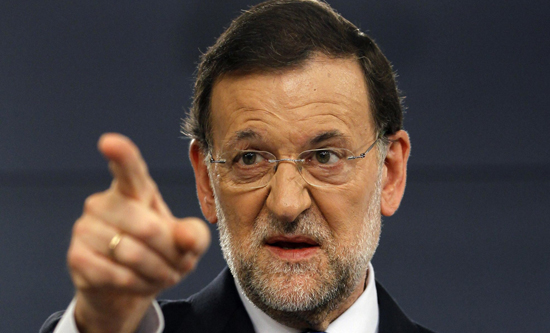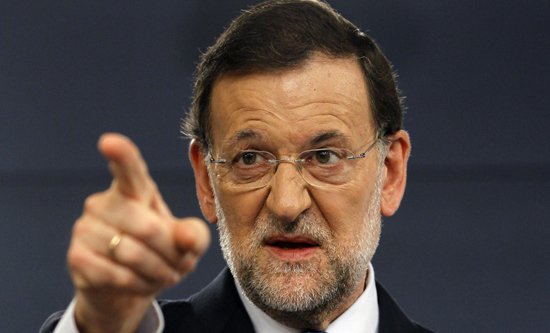
On 26 June, Spain will hold its second general election in six months, after the failure of the various parties to establish a coalition government following December’s poll. Although all the parties say they want ‘change’, their rhetoric continues to bow before the economic line decided by European imperialist institutions. The turmoil created by constant cases of corruption, repression of social movements and distrust between parties has created general disaffection and the slow polarisation of society. This time round, left-wing organisations have reached a 50-point agreement and will form a joint candidature, which may well put them in second place in the new elections.
Political manoeuvring on the left and right
After the December 2015 general election, right and left-wing parties manoeuvred to form a government, putting tactics before principles. The social-democrats of the Socialist Party (PSOE) refused to form a coalition with Podemos, United Left and other left-wing nationalists. Instead, they made a deal with the new right-wing party Ciudadanos and released a draft of their joint neoliberal economic programme. After Podemos refused to accept this reactionary pact, PSOE blamed them for ‘forcing Spaniards to go to elections again’. During the following months, Podemos avoided talks about joining forces with others on the left. In particular, it withdrew its support for a parliamentary bloc with United Left-Popular Unity, revealing again its strategy of undermining the traditional left in order to consolidate its own position. However, the government’s propaganda has alarmed potential Podemos voters, and the social democrats have turned into a very unlikely and distant ally. Therefore, the leaders of Podemos took the opportunistic step of negotiating with those they claimed to despise only a few months ago, and as a result, established a basic agreement on political, social, institutional, environmental and international issues. The convergence of more regional groups will shape this coalition, called Unidos Podemos (United We Can), and polls predict it could become the second most popular party.
President Mariano Rajoy depicts the left-wing coalition as a ‘league of radicals and extremists’ and claims his conservative People’s Party (PP) is the only one capable of preserving moderate policies, pursuing economic growth and reducing taxes. However, it was revealed that on 5 May he wrote to the European Commissioner to ask him to ‘pardon’ Spain the financial penalty for not meeting its deficit target – an indication of compliance with the austerity policies if the PP is re-elected.
Corruption
Ordinary people are suffering harsh economic restrictions and feel outraged at the endless cases of corruption. On 15 April, the Minister for Industry resigned after blatantly lying about his involvement in the ‘Panama Papers’ scandal. Nine out of ten conservative councillors in the city of Valencia were forced to resign, after being investigated for money laundering, bogus commercial operations and illegal funding of events like Formula 1 races or the visit of the Pope to Valencia in 2006. These practices have been widespread, from small councils to the highest ranks of the PP, with several networks connecting politicians with entrepreneurs, who have drained public funds, grabbing the proceeds. The former PP treasurer is imprisoned, but new findings in current cases show how ‘black money’ circulated freely to fund conservative electoral campaigns or to refurbish the PP’s headquarters in Madrid. The PP itself has been fined €1.2m in relation to these allegations. As the candidate of United Left-Popular Unity put it, ‘It seems PP is a criminal organisation which occasionally stands for election’.
In the absence of any official government, the conservative interim cabinet has refused to attend political committees investigating the misuse of taxpayers’ money. The interim government has also refused to give explanations in parliament on issues such as its vote in favour of the EU-Turkey agreement to deport refugees from Greece, or the role of Spain in the NATO mission in the Aegean Sea to control the flow of migrants. In September 2015, Spain made a commitment to the EU to give asylum to 16,000 refugees, but so far only 18 symbolic cases have been accepted. Another tactic for diverting attention from the issue of corruption has been the use of the crisis in Venezuela by political campaigns. Former president Felipe González and the Ciudadanos candidate Albert Rivera travelled to support the jailed counter-revolutionary Leopoldo Lopez, and demand the release of all ‘political prisoners’ in Venezuela. The Spanish ruling class and its mainstream media obsessively slander the Bolivarian revolutionary process and work actively for its overthrow. The ‘Venezuelan evil’ is also used to undermine Podemos, systematically portrayed in the media as a party funded by Maduro’s government to replicate the Bolivarian model in Spain.
Repression
Meanwhile, repression continues. The courts are about to announce verdicts in a number of cases related to the 2012 general strikes and 2013 street protests. In March, a farmer and Podemos councillor in the town of Jaen was given a three-and-a-half-year prison sentence for attacking the local mayor during a protest, although videos and a police report show he was actually trying to mediate and calm people down. Two Basque leaders have been arrested for speaking about torture in Spanish police stations. The eviction of a social centre in Barcelona in May resulted in police surrounding young protesters and brutally beating them, stirring up riots followed by further police aggressions. However, protests have continued and on 21 May 2016 about 10,000 activists demonstrated in the capital under the slogan ‘Madrid for all’, against racism, fascism and homophobia, deliberately coinciding with a coordinated day of action by neo-Nazi groups in Madrid, Rome and Athens.
The December 2015 elections showed the fragile balance between left and right-wing forces. Presumably, the results on 26 June will also be close. It will have to be seen if any alliance can establish a clear majority this time. Otherwise, the social-democrats of PSOE will be forced to choose whether to join the conservative PP and Ciudadanos or Unidos Podemos and other left-wing groups. The political scenario is uncertain, and is likely to lead to further polarisation.
Juanjo Rivas
Fight Racism! Fight Imperialism! 251 June/July 2016




